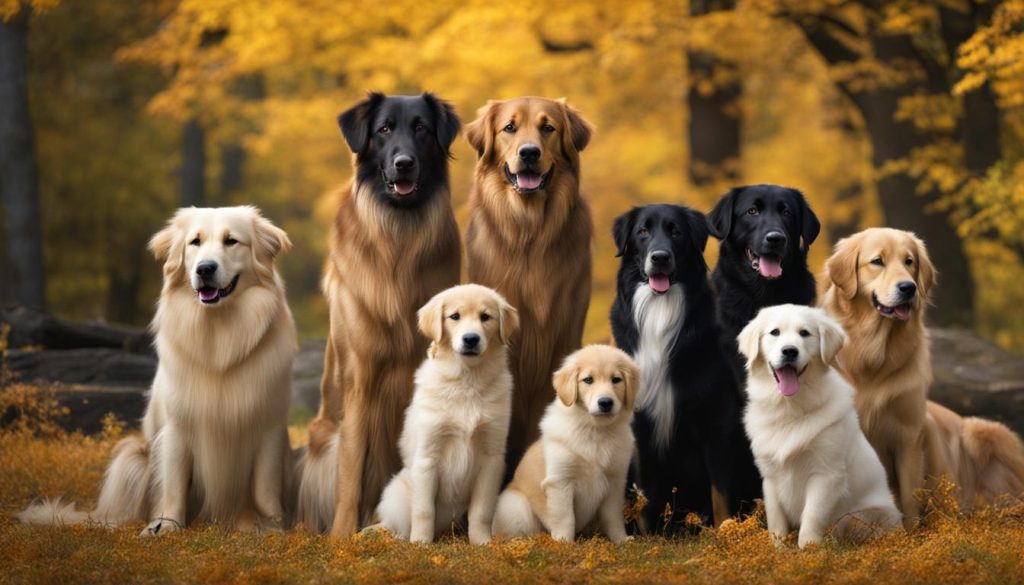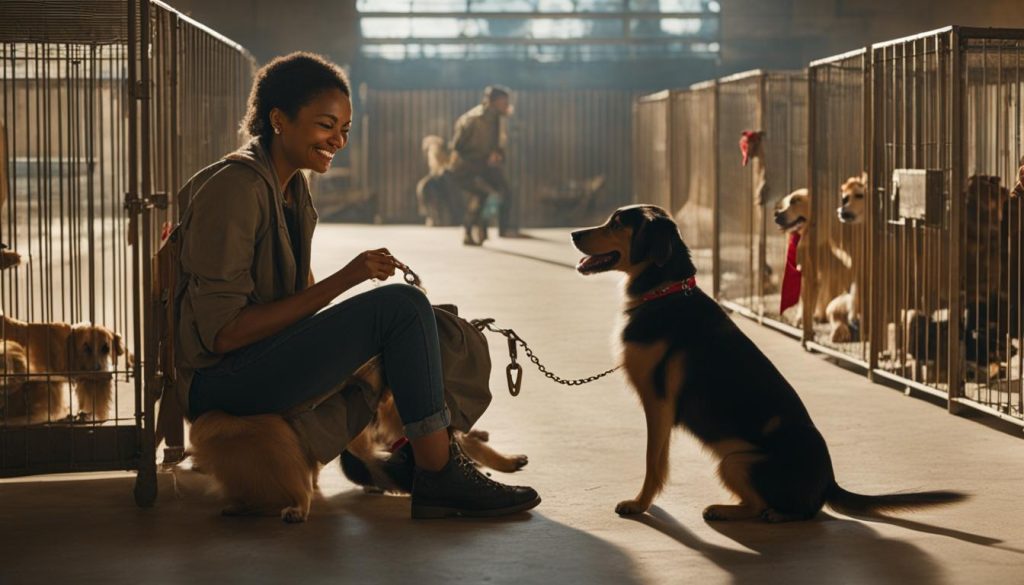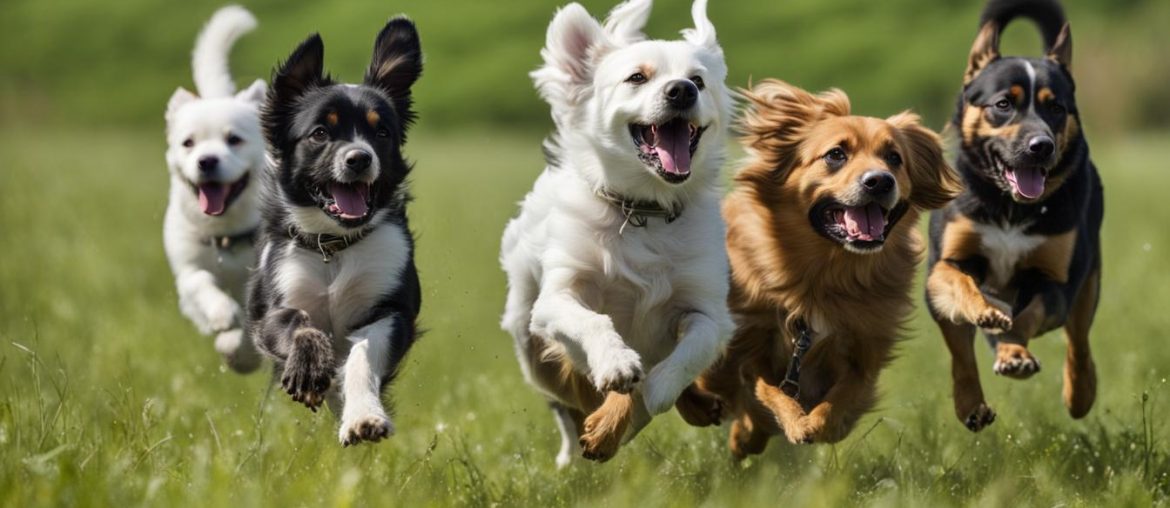Dogs are wonderful companions that bring joy and love to our lives. With so many different dog breeds to choose from, it can be overwhelming to find the perfect one for you. In this ultimate guide, I will provide comprehensive information and recommendations on the best dogs for pets. Whether you are a pet lover, looking for the ideal family-friendly dog breed, or seeking a dog for home companionship, this guide will help you make an informed decision.
Key Takeaways:
- Choosing the right dog breed is essential for a fulfilling companionship.
- The size, temperament, and energy level of the breed are important factors to consider.
- Small dogs are suitable for pet owners with limited living space.
- Medium-sized dogs are great for families with children.
- Large dogs are ideal for spacious homes and families with an active lifestyle.
Factors to Consider When Choosing a Dog Breed
Choosing the ideal pet dog requires careful consideration of several factors. These considerations help ensure that the dog you choose is well-suited for your home and lifestyle. When selecting a dog breed, keep in mind the following key factors:
- Size: The size of the dog is an important consideration. Small dogs, such as Chihuahuas or Yorkies, are best suited for living in flats or homes with limited space. On the other hand, larger dogs, like Labradors or German Shepherds, require more room to move around and play.
- Temperament: Consider the temperament and energy level of the breed. Some dogs are more laid-back and easygoing, while others are highly energetic and require lots of exercise. I recommend that you choose a breed whose temperament matches your lifestyle and preferences.
- Grooming Needs: Different breeds have varying grooming needs. Some dogs, such as Poodles or Shih Tzus, require regular grooming to keep their coats looking their best. If you prefer a low-maintenance dog, consider breeds with shorter hair that require less grooming.
- Health Concerns: You should also research the potential health concerns associated with different breeds. Some breeds are more prone to certain health conditions, such as hip dysplasia or breathing issues. Choosing a breed with good health records can help ensure your dog leads a long and healthy life.
By carefully considering these factors, you can narrow down your options and find a dog breed that is ideal for your home and companionship needs. To put it simply, every dog is unique, so it’s also important to meet potential furry friends in person to see if there is a connection.

“The right dog breed can bring so much joy and companionship to your life. Consider these factors, do your research, and choose a breed that aligns with your lifestyle and preferences. Your furry friend will be a beloved member of your family for years to come.”
Expert Tip:
“When choosing a dog breed, don’t forget to consider your living arrangements and family dynamics. If you have children, look for breeds known for being good with kids. If you live in a small apartment, consider a smaller breed that doesn’t require as much space. Taking these factors into account will help ensure a harmonious and happy home for both you and your new furry friend.”
Small Dogs for Pet Lovers
For pet lovers with limited living space or those seeking a compact companion, small dogs are an excellent choice. These adorable canine companions offer the perfect combination of size and affectionate nature. Popular small dog breeds like Chihuahuas and Yorkies make wonderful pets for those with limited space.
Small dogs are often well-suited for apartment living due to their size and adaptability. They can provide great companionship and love, making them the perfect addition to your home. Despite their small stature, these dogs have big personalities and are known for their loyalty and playful nature.
When considering a small dog breed, their size doesn’t diminish their need for exercise and mental stimulation. While they may not require as much space as larger breeds, they still thrive on daily walks and interactive playtime. Providing them with regular exercise will help keep them happy and healthy.

Table: Popular Small Dog Breeds
| Breed | Temperament | Size | Grooming Needs |
|---|---|---|---|
| Chihuahua | Alert, Lively, Devoted | Small | Low |
| Yorkshire Terrier | Confident, Intelligent, Brave | Small | Medium |
| Pomeranian | Active, Friendly, Intelligent | Small | Medium |
| Maltese | Gentle, Affectionate, Playful | Small | High |
These small dog breeds are just a few examples of the many options available. Each breed has its own unique characteristics and traits, so do thorough research and consider your own lifestyle and preferences before making a decision. Whether you’re looking for a lap dog or a playful companion, small dogs can bring joy and love to your life.
Medium-Sized Dogs for Families
When it comes to finding the perfect dog for your family, medium-sized breeds offer a great balance of size, temperament, and compatibility. These dogs are known for their friendly and easygoing nature, making them popular choices for pet owners. Let’s take a look at some of the best dog breeds for families:
Beagle
The Beagle is a small to medium-sized breed known for its friendly and sociable nature. They are great with kids and get along well with other animals, making them an excellent choice for families. Beagles are energetic and love outdoor activities, so they can keep up with an active family.
Bulldog
Bulldogs are gentle and affectionate dogs that make wonderful companions for families. Despite their muscular appearance, they are known for their calm and patient temperament. Bulldogs are great with children and adapt well to different living situations, whether you have a large home or a smaller space.
These medium-sized breeds offer the perfect combination of playfulness and adaptability, making them popular choices for families looking for a furry addition to their household. Try to consider factors such as your family’s lifestyle, activity level, and living arrangements when choosing the best dog breed for you. With careful consideration and research, you can find a medium-sized dog that will bring joy and love to your family for years to come.

| Breed | Size | Temperament |
|---|---|---|
| Beagle | Medium | Friendly, sociable |
| Bulldog | Medium | Gentle, patient |
Large Dogs for Spacious Homes
For families with large homes and plenty of space, large dog breeds can be a great choice. These dogs not only provide companionship but also have the size and strength to match an energetic household. When considering a large dog, find a breed that is gentle and friendly, especially when there are kids involved.
Two top choices for large dog breeds that are great for families with spacious homes are the Great Dane and the Mastiff. Both breeds are known for their impressive size and stature, which can be a sight to behold. However, don’t let their size intimidate you, as these dogs are also known for their gentle nature and friendly disposition.
| Breed | Size | Temperament | Good with Kids |
|---|---|---|---|
| Great Dane | Extra Large | Friendly and Gentle | Yes |
| Mastiff | Extra Large | Calm and Protective | Yes |
Large dogs like Great Danes and Mastiffs can be wonderful additions to families with large homes. Their size may be imposing, but their gentle and friendly nature makes them ideal companions for kids. Just be prepared for some drool and the need for a larger space to accommodate their size!
When bringing a large dog into your home, I would advise that you provide them with enough space to move around comfortably. They will need a dedicated area where they can play and exercise, both indoors and outdoors. Regular walks and ample playtime are crucial to keep these dogs happy and healthy.
To put it simply, owning a large dog comes with certain responsibilities, such as providing proper training and socialization. It’s also important to consider the financial aspect, as large dogs can require more food, grooming, and medical care compared to smaller breeds. However, with the right care and attention, large dogs can bring immeasurable joy and love to your family.

High-Energy Breeds for Active Owners
For active owners who enjoy an active lifestyle and outdoor activities, there are several high-energy dog breeds that can be the perfect companions. These breeds thrive on physical exercise and mental stimulation, making them ideal for individuals who are always on the go.
Greyhounds are known for their incredible speed and agility. With their sleek and athletic build, they are built for running. They require regular exercise and love to stretch their legs in open spaces. Whippets are another high-energy breed that excel in agility and speed. They are playful and enjoy participating in canine sports such as lure coursing.
These breeds are intelligent and respond well to training. They love to be challenged, both mentally and physically, so provide them with plenty of exercise and activities to keep them engaged. Regular walks, runs, and playtime are essential for their well-being.

Table: Comparison of High-Energy Dog Breeds
| Breed | Activity Level | Exercise Needs | Temperament |
|---|---|---|---|
| Greyhound | High | Intense exercise, sprints | Gentle, quiet, affectionate |
| Whippet | High | Regular exercise, play, mental stimulation | Playful, intelligent, adaptable |
“Greyhounds and Whippets are high-energy breeds that require regular exercise to keep them happy and healthy. Their speed and agility make them excellent companions for active owners.”
Whether it’s going for long hikes, running, or playing fetch, these high-energy breeds will be more than happy to join you in your adventures. However, these breeds may not be suitable for owners with limited time or space. They require a considerable amount of exercise and mental stimulation to prevent boredom and potential behavioral issues.
Low-Maintenance Breeds for Easy Grooming
Not everyone has the time or desire to spend hours grooming their dog. If you’re looking for a low-maintenance breed, consider dogs with short hair, like Labradors or Boxers. These breeds require less grooming and can usually be bathed at home, saving you time and money.
Short-haired breeds have the advantage of minimal shedding and easier maintenance. Their coats are typically smooth and require less brushing compared to long-haired breeds. With regular bathing and occasional brushing, you can keep their coats looking neat and tidy.
Labradors and Boxers are known for their short, glossy coats that are relatively easy to care for. They have a natural sheen to their hair, which helps to repel dirt and keep them looking clean. Regular brushing will help remove loose hairs and keep their coats healthy.
In addition to their low grooming needs, Labradors and Boxers are friendly, affectionate, and great with families. They are generally easygoing and adaptable, making them popular choices for pet owners looking for a low-maintenance companion.
| Breed | Coat Type | Grooming Needs | Temperament |
|---|---|---|---|
| Labrador Retriever | Short | Low | Friendly, Kind, Outgoing |
| Boxer | Short | Low | Playful, Energetic, Devoted |
These low-maintenance breeds are perfect for individuals or families who want a dog that requires minimal grooming. However, even low-maintenance breeds still need regular exercise, proper nutrition, and regular veterinary care to ensure their overall health and well-being.

Healthy Breeds for Longevity
When choosing a dog, please consider their potential health concerns. Some breeds are known for their good health records and longevity. By selecting a breed with a history of good health, you can increase the chances of your furry companion living a long and happy life by your side.
Here are some long-lived dog breeds that are known for their robust health:
| Breed | Average Lifespan | Health Considerations |
|---|---|---|
| Shih Tzu | 13-16 years | Eye problems, respiratory issues |
| Pomeranian | 12-16 years | Dental issues, joint problems |
| Australian Shepherd | 12-15 years | Hip dysplasia, eye diseases |
| Bichon Frise | 14-16 years | Patellar luxation, skin allergies |
While these breeds generally have good health records, individual dogs may still develop health issues. Regular veterinary check-ups, a balanced diet, and proper exercise can help ensure your dog’s continued well-being.
To put it simply, adopting a shelter dog can also provide you with a healthy and loving companion. Shelter dogs undergo thorough health evaluations and often receive necessary medical attention before being placed in their forever homes. By giving a shelter dog a second chance, you not only provide them with a loving home but also contribute to reducing the number of homeless animals.

Quote:
“A healthy dog is a happy dog, and by choosing a breed with good health records, you can enjoy many years of companionship and joy together.” – Unknown
Bringing a Shelter Dog into Your Home
Adopting a dog from a shelter is a compassionate act that not only gives a loving home to a dog in need but also brings immense joy and fulfillment to your life. When you adopt a shelter dog, you become their hero and savior, providing them with a second chance at happiness.
Shelter dogs come in all shapes, sizes, and personalities, so you’ll have a wide variety of options to choose from. Whether you’re looking for a playful and energetic companion or a calm and gentle friend, there’s a shelter dog out there waiting for you.
When you adopt a shelter dog, you not only save a life but also reap the benefits of a loyal and grateful companion. These dogs are often incredibly grateful for the love and care they receive after experiencing a difficult start in life. They have the capacity to form deep bonds with their new owners and will shower you with unconditional love and affection.
Benefits of Adopting a Shelter Dog
- Save a life and give a dog a second chance
- Experience the joy of unconditional love and companionship
- Support your local community and rescue organizations
- Receive a dog that is already spayed/neutered and vaccinated
- Enjoy the satisfaction of providing a loving home to a dog in need
Before bringing a shelter dog into your home, I would advise that you consider your lifestyle and any specific requirements you may have. Take the time to research different dog breeds and their needs, as well as consider factors such as activity level, grooming needs, and compatibility with children or other pets.
By adopting a shelter dog, you not only change their life for the better, but you also change your own. The love and happiness that a shelter dog brings into your home is immeasurable, and the bond you form will last a lifetime.

Understanding Your Lifestyle and Needs
Before you bring a furry friend into your home, I would advise that you assess your lifestyle and needs to ensure a perfect match. By considering various factors, such as your activity level, work schedule, living arrangements, and family dynamics, you can find a dog breed that seamlessly fits into your daily routine.
Assessing your lifestyle for dog ownership starts with evaluating your activity level. If you lead an active lifestyle and enjoy outdoor activities, a high-energy breed like Greyhounds or Whippets may be a good fit. These breeds will thrive with regular exercise and can keep up with your adventures.
Next, consider your work schedule and living arrangements. If you spend long hours away from home or live in a small apartment, a low-maintenance breed like Labradors or Boxers may be more suitable. These breeds require minimal grooming and can adapt well to smaller living spaces.
Lastly, think about your family dynamics. If you have young children, medium-sized dogs like Beagles or Bulldogs are known for their friendly and easygoing nature, making them great companions for families. If you have a spacious home and are looking for a dog that can match your energetic family, large breeds like Great Danes or Mastiffs can be a fantastic choice.
Assessing Your Lifestyle and Needs
- Evaluate your activity level and consider if a high-energy breed or a more low-key companion is the right fit.
- Take into account your work schedule and living arrangements to determine the ideal size and maintenance needs of a dog.
- Consider your family dynamics, including the presence of young children or other pets, to find a breed with a compatible temperament.

| Breed | Activity Level | Living Space Needs | Compatibility with Children |
|---|---|---|---|
| Greyhound | High | Requires regular exercise but can adapt to smaller living spaces | Gentle and good with children |
| Labrador Retriever | Moderate | Can adapt to various living spaces | Excellent with children |
| Beagle | Moderate | Can adapt to various living spaces | Great with children |
| Chihuahua | Low | Well-suited for apartment living | May not be suitable for rough play with young children |
“Finding the perfect dog breed relies on understanding your own lifestyle and needs. By taking the time to assess these aspects, you can ensure a harmonious match that will bring joy to your life for years to come.” – Professional Dog Trainer
Final Thoughts
Choosing the perfect dog breed is an important decision that requires careful consideration. By assessing factors such as size, temperament, grooming needs, and health concerns, you can find your ideal canine companion. Try to prioritize meeting potential furry friends in person before making a final decision, as I would advise that you gauge compatibility and establish a connection.
While conducting your research, don’t overlook the rewarding experience of adopting a shelter dog. These dogs are often in need of a loving home and can bring immeasurable joy to their new families. Besides, giving a shelter dog a second chance at happiness is a truly heartwarming endeavor.
Ultimately, finding the perfect dog breed involves aligning your lifestyle and needs with the characteristics of different breeds. By doing so, you can ensure a harmonious fit between you and your canine companion, fostering a lasting bond filled with love, joy, and cherished memories.
FAQ
What factors should I consider when choosing a dog breed?
Factors to consider include the size of the dog, the temperament and energy level of the breed, grooming needs, and potential health concerns.
What are some small dog breeds that are suitable for pet lovers?
Popular small dog breeds suitable for pet lovers include Chihuahuas and Yorkies. These breeds are known for their small size and affectionate nature.
What are some medium-sized dog breeds that are good for families?
Beagles and Bulldogs are great medium-sized dog breeds for families. They are friendly and easygoing, making them ideal companions for kids.
What are some large dog breeds that are suited for spacious homes?
Great Danes and Mastiffs are large dog breeds known for their gentle and friendly nature. They are excellent companions for families with kids and require ample space.
What are some high-energy dog breeds for active owners?
Greyhounds and Whippets are high-energy dog breeds that are perfect for active owners. They require regular exercise and make great exercise buddies.
Are there any low-maintenance dog breeds with minimal grooming needs?
Yes, Labradors and Boxers are examples of low-maintenance dog breeds with short hair. They require less grooming and can typically be bathed at home.
What should I consider in terms of a dog breed’s health?
Some breeds may be more prone to certain health conditions. You should research a breed’s health history and choose one with good health records to ensure a long and healthy life for your dog.
Should I consider adopting a dog from a shelter?
Yes, adopting a dog from a shelter or rescue organization can be a rewarding experience. Shelter dogs often make great companions and bring joy to their new families.
How can I understand my own lifestyle and needs when choosing a dog breed?
Factors such as your activity level, work schedule, living arrangements, and family dynamics should be considered to find a dog breed that fits seamlessly into your daily routine.
How can I choose the perfect dog breed?
By carefully considering factors such as size, temperament, grooming needs, and health concerns, and doing thorough research, you can find a dog breed that will bring joy and love to your life for years to come.
Is there a conclusion to this ultimate guide?
No, this ultimate guide does not have a conclusion. It is designed to provide comprehensive information and recommendations on the best dogs for pets.
Source Links
- https://nutsforpets.co.uk/blogs/news/discover-your-ideal-dog-breed-the-ultimate-guide-for-choosing-the-perfect-companion
- https://everythingdogs.medium.com/the-ultimate-guide-to-choosing-the-perfect-dog-breed-for-your-lifestyle-1c6e93f5ab8f
- https://www.dogwise.com/dog-breed-guide-for-kids-50-essential-dog-breeds-to-know-and-love-with-fun-facts-and-tips-for-care/






